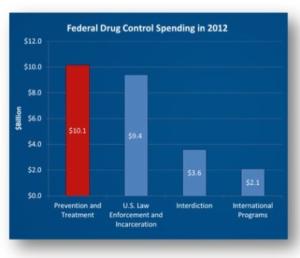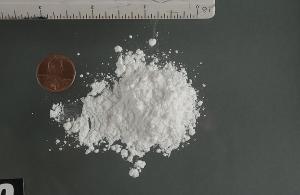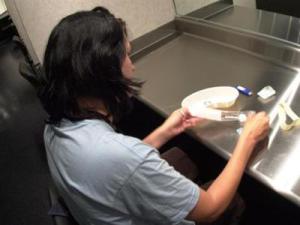The Cartagena summit saw an historic discussion of drug legalization this weekend, with President Obama conceding that the topic is a legitimate one even as he reiterated US opposition to legalization.
Oaksterdam University is bouncing back from the federal raid two weeks ago, but Richard Lee is stepping down to prepare for legal troubles and campaign for drug law reform.
The new national drug strategy is out and it looks very much like the old national drug strategy, retaining the seemingly eternal 60:40 split between law enforcement and interdiction on one hand and treatment and prevention on the other.
It's taken ever so long, but it now looks like dispensaries will soon be operating in New Jersey and Washington, DC. Meanwhile, the battles over medical marijuana continue across the country.
The Colorado Democratic Party has endorsed Amendment 64, the Regulate Marijuana Like Alcohol Act.
Missouri has the most extreme crack vs. powder cocaine sentencing disparity in the nation, but a bill that passed the House Thursday would reduce it. The bill still has to get through the Senate.
A long-awaited study has recommended supervised drug injection sites in Toronto and Ottawa, but that's just the first step in what looks to be a long and contentious process.
If grand jury indictments earlier this month are any indication, there's not enough real crime in Pitt County, North Carolina, to keep cops and prosecutors busy. The most common grand jury charge: possessing marijuana with intent.
University of Colorado Boulder officials are pulling out all the stops in a bid to squash the school's unofficial annual 4/20 rally. The ACLU is objecting, and the performer the school hired to divert students with a concert says pot ought to be legalized.
This week, we have a grab bag of crooked law enforcement types, including a big city cop, a probation officer, a prosecutor, and a TSA agent.
A drug raid gone bad has left a New Hampshire police chief dead, four other members of a drug task force wounded, and, early Friday morning, the suspect still holed up in his home with a woman, surrounded by a SWAT team.
Events and quotes of note from this week's drug policy events of years past.
Responding to a growing clamor from his Latin America colleagues at the Sixth Summit of the Americas in Cartagena, Colombia, last weekend, US President Barack Obama broached the subject of drug legalization, if only to dismiss it. But other hemispheric heads of state want this weekend's summit to be the beginning of the discussion, not the end.

Pres. Obama with Colombian Pres. Juan Manuel Santos, Brazilian Pres. Dilma Rouseff, and MSNBC's Chris Matthews (whitehouse.gov)
Pressures that have been building for a decade or more have only intensified in recent months, with Latin American leaders including Guatemalan President Otto Perez Molina, Colombian President Juan Manuel Santos, and even Mexican President Felipe Calderon calling for a frank and open discussion of alternatives to US-style war on drugs.
The calls come against a backdrop of decades of drug war in Colombia, where tens of thousands have been killed and hundreds of thousands displaced in a US-backed and -financed war on drugs that morphed into a counterinsurgency campaign after the 911 attacks more than a decade ago. The $7 billion or so the US has spent since implementing Plan Colombia under President Clinton has succeeded in reducing Colombian cocaine production, but only to see production increase in Peru and Bolivia, and only at a high cost in terms of human rights and rule of law in Colombia.
Similarly, the Mexican drug wars, which have left a toll of more than 50,000 dead in less than five years and revealed extensive and corrosive corruption, as well as human rights abuses, within Mexican law enforcement and the military, have in recent years begun bleeding into Central America. The northern tier of Central American countries -- Guatemala, Honduras, and El Salvador -- now have some of the world highest murder rates, and leaders of three of those countries attended a meeting on the theme of alternatives to the drug war last month hosted by Guatemalan President Perez.
Those pressures led US officials, including inveterate drug warrior Vice-President Joe Biden, to make an historic concession in the past few weeks: Drug legalization and other drug law reforms are indeed a legitimate arena of discussion, the Obama administration grudgingly allowed in response.
The pressure continued even before the summit officially got underway Saturday. On Friday, Guatemalan President Perez Molina, told the
BBC that current drug war policies were unworkable.
"We call for a responsible, serious
dialogue in which we scientifically analyze what is happening with the war on
drugs," the former general said.
Perez Molina elaborated in an interview with
Agence-France Presse on Saturday.
"The war we have waged over the past 40 years has not yielded results. It's a war which, to speak frankly, we are losing," he said. "Meanwhile, the black market continues to exist and dollars and weapons continue to flow in from the United States. The way we are fighting this war, we cannot win," he added.
Perez Molina downplayed Obama's dismissal of legalization, noting that he "will not innovate" while facing reelection, but adding that there is "growing awareness among (US) officials, which they have not expressed but that we know they have discussed in think tanks, non-governmental organizations, academic circles, that it is necessary to seek other alternatives" to the war on drugs. We are beginning to see that Washington is ready to begin a
dialogue, although not on decriminalization of drugs," Perez said.
Also on Saturday, in remarks reported by
CNN, Colombian President Juan Manuel Santos added to the pressure, saying that continuing current prohibitionist policies was like riding a "stationary bike": working hard, but making little forward progress.
"I think the time has come to simply analyze if what we are doing is the best we could be doing, or if we can find an alternative that would be more effective and less costly to society. One extreme can be to put all users in prison; on the other extreme, legalization. In the middle there may be more practical policies, such as decriminalizing consumption but putting all the efforts into interdiction," he said.
"This is a topic of extreme political sensitivity," Santos added.
On Saturday, in remarks reported by
USA Today, President Obama responded at some length, first in a meeting with business leaders that also included Brazilian President
Dilma Rousseff and Colombian President Santos, and later at the opening session of the summit.
"I think it is entirely legitimate to have a conversation about whether the laws in place are doing more harm than good in certain places," Obama said at the meeting of business leaders. "I personally, and my administration's position is, that legalization is not the answer, that in fact if you think about how it would end up operating, the capacity of a large-scale drug trade to dominate certain countries, if they were allowed to operate legally without any constraint could be just as corrupting, if not more corrupting than the status quo," he said.
Obama elaborated at the opening session. "Unfortunately, the drug trade is integrated, and we can't look at the issue of supply in Latin America without also looking at the issue of demand in the United States," Obama said. "I think the American people understand that the toll of
narco-trafficking on the societies of Central America, Caribbean, and parts of South America are brutal, and undermining the capacity of those countries to protect their citizens, and eroding institutions and corrupting institutions in ways that are ultimately bad for everybody," he said.
"So this is part of the reason why we've invested... about $30 billion in prevention programs, drug treatment programs looking at the drug issue not just from a law enforcement and interdiction issue, but also from a public health perspective. This is why we've worked in unprecedented fashion in cooperation with countries like Mexico on not just drugs coming north, but also guns and cash going south."
"This is one of the reasons why we have continued to invest in programs like Plan Colombia, but also now are working with Colombia, given their best practices around issues of citizen security, to have not just the United States but Colombia provide technical assistance and training to countries in Central America and the Caribbean in finding ways that they can duplicate some of the success that we've seen in Colombia. So we're mindful of our responsibilities on this issue."
While Obama reiterated that legalization is a legitimate topic of debate, he also reiterated that "the United States will not be going in this direction." (See the link above for full video and a transcript.)
Instead, it appears inexorably wedded to doing more of the same old same old. Obama announced at that summit that the way the US would address the concerns raised by the Latin American leaders would be to throw more money at them. He announced an increase to more than $130 million of funding designed to provide assistance to regional police and military forces to tackle the drug traffickers the Central American gangs that are increasingly allied with them.
But as the summit ended Sunday afternoon, President Obama seemed to take pains to indicate that his administration is open to further discussions on the theme.
"I think it is wholly appropriate to address this issue," he said in response to a question at the final press conference. "The smaller Central American and Caribbean countries are feeling overwhelmed, and there is the violence in Mexico. It wouldn't make sense not to examine what works and what doesn't and to constantly try to ask ourselves if there is something we can do to prevent violence, to weaken these drug traffickers, to make sure they're not peddling this stuff to our kids and perpetrating violence in the region. I'm not somebody who believes legalization is a path toward solving this problem," he underlined, "but there are additional steps we can take to be more creative and ways we can combine law enforcement and interdiction approaches with the public health approach that I think is important back home. I'm looking forward to continuing to have that conversation."
"This is one of many issues that some countries want to put on the table," said President Santos, seeming to scold the press for placing such an emphasis on the drug issue. "This was one of the issues we discussed. We heard positions from the US and other countries; they were all laid out on the table, and this is a positive step."
The Cartagena summit is now history. The drug war rolls on, but the US is now on notice from its neighbors that the drug war status quo is not tolerable, and the US has indicated that it is open to further exploration of the issue. The Obama administration has not taken the great leap of embracing drug legalization, but it has now gone further than any previous US administration is admitting there may be alternatives to perpetual drug war.
back to top
At an Oakland press conference Wednesday, Oaksterdam University announced that it would attempt to stay open in the wake of the April 2 federal raid on its campus and associated businesses, but that its founder, Richard Lee, would no longer be involved with the business. Lee, Oaksterdam representatives, and others also used the press conference to call for a national day of action Friday (4/20) and for people to barrage the Obama White House with phone calls demanding it end its policy of repression aimed at medical marijuana providers.
"My future is very uncertain," Lee said. "I'm waiting for a possible legal case. But I hope to be free to support marijuana legalization campaigns like in Colorado and Washington and medical marijuana campaigns like in Ohio. This is a big issue and getting bigger. If I can use my notoriety to help, I will do what I can."
Lee will be replaced at
Oaksterdam University by Dale Sky Jones, who was the school's executive chancellor and who worked closely with Lee in 2010's Proposition 19 campaign. Jones and
Oaksterdam will face some tough challenges. The federal raiders stripped the campus of all its equipment and computers, and the school has been unable to hold classes or pay staff. Instead, some 45 people are working on a volunteer basis to get it up and running again.
"The raid knocked the wind out of us," said Jones. "We will need help to get back on our feet in the short term, but in the long term, we will come back."
The school will have to move to a smaller, more affordable, space, Jones said.
"It's not sustainable in the current building," she explained. "We'll keep leasing the auditorium where we teach classes until further notice, and that will allow us to continue to enroll new students, which will allow us to buy new computers. But our office will move to a new location. We're staying in the heart of
Oaksterdam, but with a much smaller office space. We've created a new parent company that will have the
Oaksterdam trademark.
Oaksterdam University will survive, just with a new parent company."
Some 15,000 people have taken courses at
Oaksterdam, with a curriculum covering all aspects of the medical marijuana industry, from the basics of growing to how to run a business to how to navigate the maze of state, federal, and local laws and regulations. The school has been at the heart of the revitalization of Broadway in downtown Oakland, as well as at the heart of the East Bay medical marijuana community.
"In terms of public safety, I've been to downtown Oakland on numerous occasions, and if you think this will make it a safer community, it will do just the opposite," said Neill Franklin, a former Baltimore police commander in the city's Bureau of Drug and Criminal Enforcement, and executive director of
Law Enforcement Against Prohibition (LEAP). "Effective public safety is the result of healthy communities, not police action. When people come together, as they did in
Oaksterdam, that's when crime is reduced. Now, we'll have patients forced back into the criminal market, funding organized crime. The public is trying to send a message to Washington, DC, that it's time to move away from these destructive prohibition policies."
"This cost the jobs of 100 union members, and those were good jobs with a decent wage," said Ron Lind, president of the
UFCW's Local 5, which represents Bay area dispensary workers. "This misguided policy doesn't only impact patients; it also impacts workers. We will continue to support
Oaksterdam and its reemergence. There is a huge potential for good middle-class jobs throughout this industry, and it's time for the federal government to stop undermining it."
"This administration is out of touch not only with the public, but with its own campaign pledges," said Franklin. "Obama won last time after forcefully pledging to back off from the federal attacks. Anyone who thinks this is a good electoral strategy needs to look at the polling," in which support for medical marijuana typically runs at 70% or higher.

Richard Lee surrounded by supporters in San Francisco a day after the April 2 raid
Given the ongoing federal crackdown, it is time for
Oaksterdam University to broaden its mission, said Jones.
"Our focus has been on providing quality education to the cannabis community, but we need to start focusing on creating safer communities by controlling, taxing, and regulating cannabis," she said. "These days, it's more accessible than any other drugs. You're not getting it at the store, but behind the store. You don't see legal wine grape growers wielding machine guns."
"We want to thank Richard Lee and
Oaksterdam for all you do," said Laura Thomas, interim state director for the
Drug Policy Alliance, "both to increase access to medical cannabis and for Proposition 19. We join in calling on people to let the president know what you think of this raid and his drug policies in general. Obama has for the first time acknowledged that there needs to be debate on this topic. We need to let him know that legalization is something that should be talked about."
Oaksterdam supporters will gather at the campus Friday for a demonstration and march to the Oakland federal building. They are also urging sympathizers to sign a
petition to President Obama urging him to stop the raids. It has more than 23,000 signatures so far.
"This is a big political issue," said Lee. "We're getting a lot of support right now, and the most recent polls show legalization with about a 5% lead across the country. The opponents of ending cannabis prohibition are fighting back. This issue is at the tipping point."
back to top
The Obama administration released its 2012 National Drug Control Strategy and accompanying 2013 drug budget Tuesday, but while the administration touted it as a "drug policy for the 21st Century," it is very much of a piece with anti-drug policies going back to the days of Richard Nixon.

federal_drug_control_spending_2012.jpg
The federal government will spend more than $25 billion on drug law enforcement under the proposed budget, and despite the administration's talk about emphasizing prevention and treatment over war on drugs spending, it retains the same roughly 60:40 ratio of law enforcement and interdiction spending over treatment and prevention training that has obtained in federal drug budgets going back years.
The administration is high-lighting a renewed emphasis on drugged driving and is encouraging states to pass "zero tolerance" drugged driving laws. It is also emphasizing the massive increase in non-prescription use of
opioid pain pills.
While the strategy calls for lesser reliance on imprisonment for drug offenders, it also calls for increased "community corrections" surveillance of them, including calling for expanded drug testing with "swift and certain" sanctions for positive tests. But drug testing isn't just for parolees and probationers; the drug strategy calls for expanded drug testing in the workplace, as well.
The drug strategy acknowledges the calls for recognition of medical marijuana and marijuana legalization, but only to dismiss them.
"While the Administration supports ongoing research into determining what components of the marijuana plant can be used as medicine, to date, neither the FDA nor the Institute of Medicine has found the marijuana plant itself to meet the modern standard for safe or effective medicine for any condition," the strategy said. "The Administration also recognizes that legalizing marijuana would not provide the answer to any of the health, social, youth education, criminal justice, and community quality of life challenges associated with drug use."
This year's drug strategy looks like last year's drug strategy, which looked like Bush administration drug strategies, which looked like Clinton administration drug strategies. When it comes to the federal drug war, it's more of the same old same old.
Look for an expanded version of this news brief Thursday afternoon, with deeper analysis and commentary from drug war observers.
back to top
It's taken ever so long, but it now looks like dispensaries will soon be operating in Arizona, New Jersey and Washington, DC. Meanwhile, the battles over medical marijuana continue across the country. Let's get to it:
Arizona
Last Wednesday,
the state announced it would begin accepting dispensary applications next month. The Arizona Department of Health Services said it will accept applications for medical marijuana dispensaries from May 14 through May 25. Voters approved medical marijuana in November 2010, but
Gov. Jan Brewer (R) dragged her feet on approving dispensaries, citing fears of federal prosecution of state employees. She lost in federal court. The health department will announce which dispensaries are awarded licenses on August 7.
California
Last Tuesday,
a proposal to shut down dispensaries in Vallejo died in a split city council vote. Mayor
Osby Davis had proposed sending cease and desist orders to the city's dispensaries, but the motion failed on a 3-3 vote. Later in the same meeting, the council voted 5-1 to have City Manager Dan Keen send a policy-clarifying letter, and warning, to all dispensaries. Keen's pending letter is expected to include information on the city's new medical marijuana business tax, approved by voters in November, and a reminder that the tax does not provide dispensaries with immunity to law enforcement. The letters are also to include an explanation of laws the city enforces in regard to dispensaries and a warning that dispensaries are subject to further potential raids. Several raids have occurred since late February, and operators have been arrested for allegedly violating state laws.
Also last Tuesday,
a Murrieta dispensary won a victory in court when a Riverside Superior Court judge ruled this week that the city cannot bar it from opening. The Cooperative Medical Group might not reopen, though, because if it does, it could face another lawsuit from the city for violating a temporary moratorium on dispensaries. The moratorium runs through October 2013.
Last Thursday,
the San Francisco Planning Commission approved a permit for a new dispensary in the SOMA district. That's the fifth new dispensary approved by the commission in the last two months. Five is coincidentally the number of dispensaries forced to close recently under federal threat. The city Planning Department staff had recommended the permit not be approved, but commissioners overrode them.
Also last Thursday,
Orange County deputies raided the Charles Café, a small dispensary that was the last one remaining in Lake Forest. It was the third raid on the dispensary in the last six months, and now the Charles is shut down. The Orange County Sheriff's Department said it had executed a search warrant there, but had no information about any arrests or seizures. Lake Forest once had 40 dispensaries, but Lake Forest City Attorney Scott Smith wrote to the US Attorney for Southern California seeking assistance and got it. The feds cracked down on dispensaries, including a November 2011 raid on the Charles. It had already been hit by Orange County deputies the previous May.
Last Friday,
two Long Beach dispensary operators won a new trial after the judge in their case sent a complimentary letter to prosecutors after they were convicted on marijuana sales and related charges but before they were sentenced. Joe
Grumbine and Joe Byron saw their convictions thrown out after an appeals court found that Long Beach Superior Court Judge Charles Sheldon had a strong bias against medical marijuana defenses. The pair has maintained there was no illegal activity at the cooperatives, two in Long Beach and one in Garden Grove, but that they were the victims of overzealous police and prosecutors.
On Tuesday,
a bill to regulate medical marijuana distribution statewide won a vote in the Assembly Public Safety Committee. The bill, AB 2312, introduced by Assemblyman Tom
Ammiano (D-San Francisco), would also prevent most bans on cooperatives and collectives and limit the amount of taxes cities and counties can collect.
Also on Tuesday, a bill that would have required state-issued ID for patients was dropped. The bill, AB 2465, introduced by
Assemblywoman Nora Campos, was challenged as an unconstitutional violation of patients' rights under Proposition 215.
Also on Tuesday,
a replacement for Richard Lee as head of Oaksterdam University was announced. Stepping up is Dale Sky Jones, who had been executive chancellor at the university and who had worked with Lee on the Proposition 19 campaign in 2010. See our feature story on this in this issue.
Colorado
Last week, a Fort Collins initiative campaign to overturn a dispensary ban got underway. Medical marijuana supporters filed a petition notice with the city clerk's office, and once the wording is approved, they will have 60 days to collect 4,214 valid voter signatures. If they do, the measure will appear on the November ballot.
Delaware
Last Thursday, the state issued proposed regulations for the medical marijuana program. The Department of Health and Social Services proposal does not include regulations for dispensaries. The department is taking public comment on the regulations through April 30.
Maine
Last weekend, a medical marijuana exposition in Augusta attracted hundreds of people. The Canna Maineia Medical Marijuana Exposition also featured live music and dozens of vendors. Much of the conference focused on providing information to patients on how to grow their own medicine.
Michigan
Last Friday, police raided a South Haven dispensary and arrested one man. The target was Tranquility Central, which police searched in an investigation into the "illegal sale and distribution" of marijuana.
On Tuesday, medical marijuana supporters demonstrated at the state capitol to protest proposed changes in the state's medical marijuana law. Legislators are considering a package of bills they say will clarify the voter-approved law, but patients say the changes infringe on their rights. The four bills have made it out of committee and await a House floor vote. HB 4834 would require a photograph for medical marijuana patient registration cards, extend the expiration from one to two years, and would allow law enforcement officers or officials to access medical marijuana patient information. HB 4851 attempts to clarify the definition of “bona fide physician-patient relationship,” which is required for medical marijuana cardholders. HB 4853 lays out sentencing guidelines, and HB 4856 regulates the transportation of medical marijuana in cars.
On Monday, the city of Douglas extended its dispensary moratorium for another 60 days. The town first addressed the possibility of a medical marijuana operation in July 2010, and city planners drafted an ordinance, but the planning commission rejected it last week. The city is waiting for the state Supreme Court to rule on pending cases.
Montana
Last Wednesday, Tom Daubert agreed to a plea bargain on federal drug charges. Daubert, one of the state's most well-known medical marijuana advocates, will plead guilty to conspiracy to maintain drug involved premises. He was a co-owner of Montana Cannabis, one of the dozens of dispensaries and other medical marijuana businesses raided by the feds in March 2011. He helped draft the state's voter-approved medical marijuana initiative and is the founder of the group Patients and Families United. He's looking at up to 20 years in federal prison.
New Jersey
On Monday, the state finally issued the first permit for a medical marijuana grow. The state Department of Health announced the permit for the Greenleaf Compassion Center in Montclair.The center will need a second permit before it can begin providing marijuana to patients, but since it will take three to four months for the first crop to be harvested, the state is confident it can issue that permit before harvest time.
On Tuesday, Gov. Chris Christie (R) said Greenleaf's owner "should stop complaining" about delays in implementing the state's program, which was signed into law in January 2010, but has yet to see a single dispensary sell any medical marijuana to any patient. Christie blamed legislators and former Gov. Jon Corzine (D) for forcing him to delay the program in order to address what he called concerns about security.
Washington
Last Thursday, a judge denied a temporary restraining order to block Bellingham from shutting down two medical marijuana cooperatives raided by police last month. The Northern Cross and The Joint collectives had sought the order, but Whatcom County Superior Court Judge Steven Mura denied it, saying it would be an "empty order."
Washington, DC
Last Thursday, the city health department announced it given four applicants preliminary approval to run dispensaries in the nation's capital. Seventeen potential operators had applied, and the four selected had all scored enough points to seek approval from their advisory neighborhood commissions. The move to advance the dispensary licensing comes two weeks after officials gave the green light to six medical marijuana cultivation centers. Those businesses now are pursuing business licenses and other permits in order to get final approval to open and operate.
back to top
Delegates at the Colorado Democratic Party state convention in Pueblo Saturday formally endorsed Amendment 64, the Regulate Marijuana Like Alcohol Act. Because support for the initiative was so strong at the convention, the endorsement becomes part of the party's "essential" platform.

a-MJLEGALBILLBOARD_FACEBOOKCOLOMJINITIATIVE2012-640x468_0.jpg
The initiative had already won the support of Democrats in 15 counties, including eight of the 10 most populous. Those counties are Boulder, Delta, Denver, Douglas, Eagle,
Elbert, El Paso, Garfield, Jefferson, La Plata,
Larimer,
Pitkin, Pueblo,
Routt, and Weld.
"This is a mainstream issue," said Cindy
Lowery-Graber, chair of the Denver Democratic Party. "Polls show that more than 60% of Democrats and a solid majority of independents believe marijuana should be treated like alcohol. A broad coalition is forming in support of Amendment 64 and I am proud to say that it now includes the Colorado Democratic Party."
It's not just Democrats and independents who are supporting the notion of marijuana regulation. Last month,
the Denver County Republican Assembly approved a resolution calling for just that, although they did not explicitly endorse Amendment 64. That resolution got 56% of the vote.
"While there may be more support among Democrats and independents, this is quickly becoming a popular position," the campaign's Mason
Tvert told
Westword over the weekend. "Supporting an end to marijuana prohibition and regulating marijuana like alcohol is a position that spans the political and ideological spectrum."
Colorado is not the only state where marijuana legalization will be on the ballot in November. A similar measure has qualified in Washington state. Signature-gathering campaigns are ongoing in a number of other states, with Montana and Oregon appearing to have the best shot of making the ballot.
back to top
The Missouri House of Representatives last Thursday approved reducing the sentencing disparity between crack and powder cocaine offenses. The move came as the House approved a larger judiciary bill, which now heads to the Senate.

Some cocaine is still more equal than other under a Missouri bill, but there is less of a sentencing disparity. (wikimedia.org)
The disparity in Missouri's crack sentencing law, adopted in 1989 in the midst of drug war hysteria, is the most extreme in the nation. Under the law, a person convicted of selling 2.5 grams of crack cocaine earns the same mandatory minimum 10-year prison sentence as someone selling 425 grams of powder cocaine.
Under the measure approved by the House, it would take the sale of 28 grams of crack to generate that same mandatory minimum sentence.
"I think it's a matter of fairness," House Speaker Steven
Tilley (
R-Perryville) explained.
The move to address the disparity gained traction after a
Sentencing Project report last year highlighted the extreme nature of the Missouri disparity. "Harsh drug penalties like these are a contributing factor to the exceptionally high rates of incarceration and overcrowding in state prison facilities," the report noted.
While the measure had bipartisan support in the House with only one no vote, the judiciary bill's prospects in the Senate are unclear. The bill deals with a variety of other issues, ranging from fees for trial transcripts to guidelines to licensing foster care providers to making the St. Louis circuit clerk position an appointed one, rather than an elected one.
back to top
A long-awaited report from Canadian researchers is recommending that Toronto could use three supervised drug injection sites and Ottawa could use two. The report said the sites would be a good health care investment, would reduce drug use, and would reduce the rate of new HIV and hepatitis C infections.

Vancouver's InSite (BCCHA)
The study, the
Toronto and Ottawa Supervised Consumption Assessment (
TOSCA), did not make specific location recommendations for the sites, saying that should be left up to the cities themselves, should they decided to follow the recommendations.
"Supervised injection facilities in Toronto have the potential to offer meaningful improvements for the health of people who use drugs," said the study's co-principal investigator, Dr. Ahmed
Bayoumi from the Center for Research on Inner City Health at St. Michael's Hospital. "The facilities could also make neighborhoods where drug use is common more livable."
But within hours after the study was released, some Toronto elected officials were expressing hesitation.
Deputy Mayor Doug
Holyday told the
Toronto Star local official need to see all the "facts and figures" behind the study before they decide to approve a safe-injection site. "I have some doubts as to whether or not there is real benefit and whether or not you don't just attract more problems so I would like to really get the thorough results of other places that have done this and I'd like to hear from other experts on the matter," he said.
"There has not been enough research done on the topic in Toronto -- whether that is the way to go with Toronto," echoed
Councillor John
Filion, chair of the city's board of health, which will consider
TOSCA's recommendations.
Toronto Police Chief Bill Blair told reporters late Wednesday that he opposes supervised injection sites, a stance that
TOSCA noted in its report. "My concern is there need to be sufficient assurances within the community that the quality of life will not be put in jeopardy," Blair said.
But not everyone at City Hall was so hesitant. There is already ample evidence of the benefits of supervised injection sites,
Councillor Gord Perks, chair of the Toronto Drug Strategy Implementation Task Force, told the Star.
"We have today in front of us research that shows there are lives to be saved, money to be saved and neighborhoods to be improved," said Perks. "When you have differing views you go to the evidence, and the evidence is clear -- supervised injection sites save money, save lives and improve the quality of our neighborhoods."
The province of Ontario said it was open to evidence, but had no immediate plans to move forward.
"We are always prepared to listen to good advice, and we make our decisions based on evidence," Health Minister Deb Mathews said in a written statement Wednesday. "Experts continue to be divided on the value of the sites. We have no plans to pursue supervised sites at this time."
Canada's only operating supervised injection site is
InSite in Vancouver. It is operating under an exemption from Canada's drug laws, much to the chagrin of the Conservative national government. Any future supervised injections sites would have to win similar exemptions. But at this point, worrying about that seems premature.
back to top
A Pitt County (Greenville), North Carolina, grand jury offered up a batch of indictments on April 9 that suggest that the war on drugs is generating most of the criminal justice system activity in the county. This snapshot offers a revealing glance at just what law enforcement and prosecutors are spending their resources on, at least with this grand jury.

City Hall, Greenville (wikimedia.org)
Grand juries are empanelled by local prosecutors to bring charges when prosecutors believe they have evidence a person can be charged with a crime. Grand jury indictments are a strong indicator of law enforcement and prosecutorial priorities.
Overall, the April grand jury indicted 37 people felony charges. Only two were for violent offenses, both of which were assaults with a deadly weapon. Another two people were indicted for child sex offenses.
One person was indicted for possession of a stolen firearm and carrying a concealed weapon, one for obstruction of justice, one for breaking and entering, and four more for various theft offenses (obtaining property under
false pretenses, larceny by an employee, larceny of a merchant, financial card theft).
Overall, 15 people were indicted on non-drug offenses. But 22 were indicted in cases where drugs were the leading charge, and eight of them were indicted for possession of marijuana with the intent to sell and deliver. That's 22% of all the indictments, or nearly one-quarter of the grand jury's business.
Another four people were charged with possession of cocaine with intent to sell and deliver, three people were charged with trafficking heroin/opium, three with trafficking a Schedule II controlled substance (pain pills), two with conspiracy to traffic cocaine, one with possession of cocaine, and one with attempting to obtain a controlled substance by fraud.
Drug possession or sales cases thus accounted for a whopping 60% of all indictments by the April 9 grand jury. If drug possession and sales were not criminal offenses, police and prosecutors could use those resources elsewhere, or elected officials could decide that police and prosecutors don't need as many resources and reallocate those taxpayer dollars to more fruitful ventures. Or they could lower taxes.
back to top
The University of Colorado Boulder campus will be a virtual police state Friday as university administrators attempt to thwart the school's unofficial annual 4/20 rally. Administrators last Friday announced plans to heighten security, including barring the public from entering the grounds of the public university.

Clouds of smoke hover over the crowd estimated at 10,000 at last year's rally. (NORML)
The annual campus event, featuring speakers and marijuana, has drawn thousands of attendees in recent years, including around 10,000 last year. Over the years, university administrators have tried various means to suppress the event, but this year, they are really clamping down. That has the ACLU crying foul.
The university's security plan for Friday includes barring everyone except students, faculty, and staff from campus and threatening to issue trespassing citations to violators. Those tickets carry a penalty of up to six months in jail and a $750 fine. All students, faculty, and staff must carry and present university-issued identification as they pass through police check-points set up at all major campus entrances.
Officially sanctioned campus visitors -- those who have tickets for university events or who are participating in academic meetings, symposia, and other events—must apply for a special registration to be able to get onto the campus. No visitors, even the officially sanctioned ones, will be allowed to park on campus, and police will be patrolling parking lots.
The on-campus site of the 4/20 rally, the grassy area of the
Norlin Quad, will be closed to everyone, and anyone entering it, even students, will be cited for trespassing. The university will also go the extra mile by dumping fish fertilizer on the Quad the day of the rally.
The university is also threatening to once again ticket people for marijuana possession and is promising "a larger presence of officers" this year. It said campus police, as well as police from other regional agencies, will be on hand, and the Colorado State Patrol will be conducting "enhanced patrols" on local highways.
And the university is calling in the Colorado Department of Revenue's Medical Marijuana Enforcement Division, which will have a team of officers deployed on campus across Boulder "to monitor medical marijuana centers and ensure compliance with licensing regulations." School officials warned that anyone caught smoking pot could lose his or her medical marijuana registration, in addition to fines and university sanctions.
The university has also scheduled a
Wyclef Jean concert for Friday afternoon in a bid to draw students away from the 4/20 rally. Ironically for a campus where students have embraced the "marijuana is safer than alcohol" message, the concert will be held at the Coors Performing Arts Center.
UC-Boulder is one of the Colorado campuses where Mason
Tvert and
SAFER (Safer Alternatives for Enjoyable Recreations) honed their "marijuana is safer" message, winning non-binding initiatives among students, before moving on to win a legalization vote in Denver and, this year, successfully waging a campaign with allies to put the
Regulate Marijuana Like Alcohol legalization initiative on the November ballot.
"The gathering disrupts teaching and research right in the heart of the campus," said CU-Boulder Chancellor Philip
DiStefano, as he announced the measures. "The size of the crowd has become unmanageable, and limits our faculty, staff and students from getting to class, entering buildings and doing their basic work. It needs to end."
But Mark Silverstein, director of the ACLU of Colorado, said the university's clamp down was a bid to thwart free speech.
"By closing the campus to visitors, establishing checkpoints, assigning uniformed officers to check papers and threatening arrests of visitors without proper credentials, the university does a disservice to the values that underlie the First Amendment and the constitutionally protected right to dissent," he told the school newspaper the
Daily Camera Monday.
While the Constitution doesn't include the right to smoke marijuana in public, he said, it does protect the rights of students to assemble with others to express their views, including non-students. Silverstein declined to say whether the ACLU would take legal action.
As for
Wyclef Jean, the former
Fugees singer and Haitian presidential candidate told the
Daily Camera he was down with 4/20.
"I look up to people like Bob Marley and Bob Dylan, you know what I'm saying? I would say for me it's more -- those kinds of holidays are natural. For me that's an everyday holiday," he said before saying marijuana should be legalized because it's mostly harmless, prohibition has never worked, and it could be a boost for the economy.
"It's not about the marijuana smoking," Jean said. "At the end of the day, the teens are out there and they're going to do ecstasy, they're
gonna do coke, they're
gonna do molly, and they're going to OD. Something that's from the ground, an herb, used an in a responsible form, I can't see what's wrong."
Maybe Jean could take time after his performance to clue in the chancellor.
back to top
This week, we have a grab bag of crooked law enforcement types, including a big city cop, a probation officer, a prosecutor, and a TSA agent. Let's get to it:
In Durham, North Carolina,
a state probation officer was arrested last Thursday on drug trafficking charges. Todd
Tronzo, 35, faces four counts of trafficking Schedule I drugs, two counts of possession with the intent to manufacture, sell or deliver Schedule I drugs, two counts of maintaining a vehicle for the sale or possession of controlled substances, and one count each of trafficking by transportation, trafficking by possession and possession of drug paraphernalia. He was being held in the Vance County jail under a $1 million bond. Police said the arrest was part of an ongoing investigation.
Tronzo has been a probation officer with the Division of Community Correction since February 2007 and is now on "unapproved leave."
In North Bergen, New Jersey,
a North Bergen municipal prosecutor was arrested last Friday on charges he was involved in a marijuana distribution network that shipped up to a thousand pounds of pot from Northern California.
Marcanton Macri, 44, is charged with money laundering and financial facilitation.
Macri was caught up in the investigation of two local men who were making regular trips to California's Emerald Triangle area and sending weed back to Jersey from various Northern California post offices. That pair used the services of a local assistant bank manager to help deal with their cash, and
Macri is accused of facilitating that relationship. He has been suspended from his prosecutor's gig.
In New Haven, Connecticut,
a former Transportation Security Administration officer pleaded guilty Tuesday for his role in a pain pill trafficking ring. Jonathan Best, 30, copped to a single count of conspiracy to distribute and to possess with intent to distribute
oxycodone. He accepted $2,500 from a trafficker and $1,000 from an undercover law enforcement officer to allow the trafficker to pass through security at Palm Beach International Airport with thousands of pills that he believed were to be sold in Connecticut. But the trafficker was a snitch, and Best went down. He's looking at up to 20 years.
In Houston,
a former Houston police sergeant was sentenced last Thursday to 15 years in federal prison for taking a bribe and, while in uniform, using his patrol car to escort a load of cocaine. Leslie
Aikens, 47, was convicted of corruption charges last fall after getting burnt in a sting operation by the FBI and the Texas Rangers. Investigators had received a tip that
Aikens was dirty, and arranged for him to escort a load of 15 pounds of cocaine coming into Houston. In return, he was to be paid $2,000.
Aikens' defense argued unsuccessfully that he didn't know drugs were involved and he thought he was escorting a load of beer.
back to top
Greenland, New Hampshire, Police Chief Michael Maloney was shot and killed and four other officers were shot and wounded during a drug raid last Thursday evening. Maloney becomes the 23rd person to die in US domestic drug law enforcement operations so far this year.

Greenland, NH, Police Chief Michael Maloney (Greenland PD)
at a press conference that night, the male suspect in the shooting and a female remained barricaded inside his home along and surrounded by a SWAT team, which was called to the scene after shooting broke out. The resident at the address in the raid has been identified as Cullen
Mutrie, 29, who was facing steroid possession charges after police who came to his home to confiscate guns after a 2010 domestic violence complaint found them in his living room.
[Update: Mutrie and the as yet unidentified woman were found dead inside the home after a police robot was sent in early last Friday morning. Police said it wasn't clear if it was a murder-suicide or a double suicide. They become the 24th and 25th persons to die in US domestic drug law enforcement operations so far this year.]
It's not yet clear precisely why police were raiding his home Thursday. Police did confirm it was a drug raid and that the suspect had opened fire. Other than that, it is also unclear exactly what transpired, except that Maloney is dead and four officers are wounded. They have been identified as
Det. Jeremiah Murphy of the Rochester Police Department,
Det. Gregory Turner of the Dover Police Department,
Det. Eric
Kulberg of the University of New Hampshire Police Department and
Det. Scott
Kukesh of the
Newmarket Police Department.
Two of the four were shot in the chest and were in intensive care early Friday. Two others were treated and released, one with a gunshot wound to the arm and the other with a gunshot wound to the shoulder. They were working as part of a drug task force.
Maloney, 48, was a 26-year law enforcement veteran and had been chief in Greenland for the past 12 years. He was due to retire in less than two weeks.
back to top
April 25, 1894: The British Indian Hemp Drug Commission concludes that cannabis has no addictive properties, some medical uses, and a number of positive emotional and social benefits.
April 19, 1943: Albert Hoffman takes the first dose of LSD, in Basel, Switzerland.
April 23, 1998: The Ottawa Citizen reports that Canadians who tell US border officials the truth about their past use of marijuana will be denied entry to America indefinitely.
April 25, 2000: Despite the formal opposition of the Hawaiian Catholic Church, the Hawaii State Senate passes medical marijuana legislation, joining California, Oregon, Washington, Maine, Alaska, and Arizona in shielding medical marijuana patients from criminal prosecution.
April 20, 2001: American Christian missionary Veronica Bowers and her seven month-old daughter, Charity, are killed when their small plane is shot out of the sky by a Peruvian military jet as part of a CIA-backed program that patrols the Amazon Basin for drug couriers. The Senate Intelligence Committee investigates and concludes the missionary pilot did nothing wrong and should not have come under fire.
April 24, 2001: In Oklahoma, Will Foster, 42, a medical marijuana patient who in 1995 was sentenced to 93 years in prison for growing 39 marijuana plants in his basement, is released on parole. Foster used marijuana to relieve chronic pain caused by acute rheumatoid arthritis. "My medical use of marijuana never interfered with my work, I ran a successful business," said Foster. He added, "I was minding my own business taking care of my health and my family. What was I doing to anybody that got me 93 years?"
April 20, 2002: Robin Prosser of Missoula, Montana begins a hunger strike demanding access to government grown marijuana to help her treat symptoms of Lupus. Prosser says that marijuana helps combat the illness and relieves her pain and stress.
April 21, 2004: US Circuit Court Judge Jeremy
Fogel bars the US Dept. of Justice from interfering with Mike and Valerie Corral, heads of a medical marijuana hospice near Santa Cruz, California, with their 250 patients, or with their marijuana garden. Judge
Fogel cites
Raich v.
Ashcroft, a 2004 Ninth Circuit decision which found the federal government has no jurisdiction over patients who grow their own plants.
April 22, 2004: The Pacific edition of the magazine Stars and Stripes reports that twenty sailors assigned to Commander, Naval Forces
Marianas (Guam) were arrested on drug-related charges since late 2003 alone.
back to top











